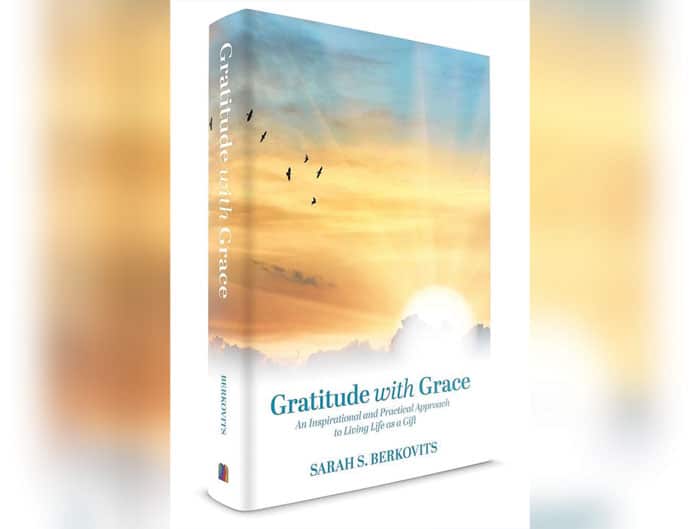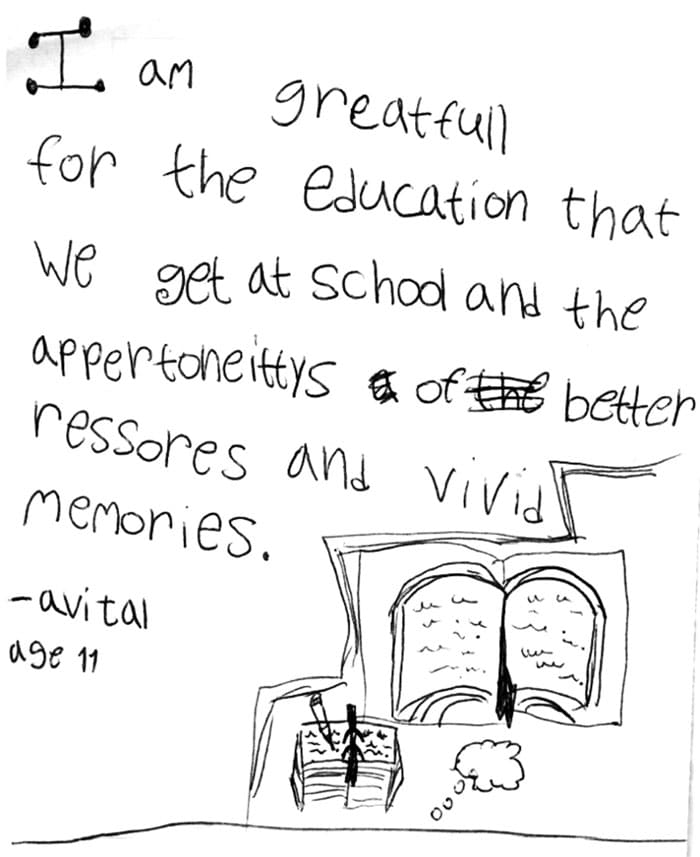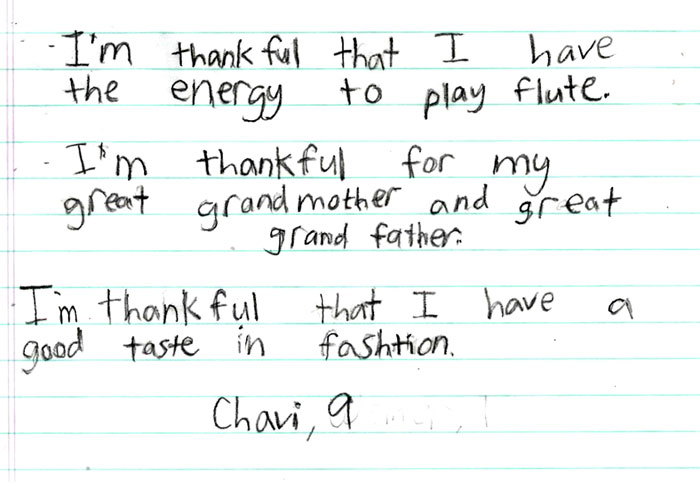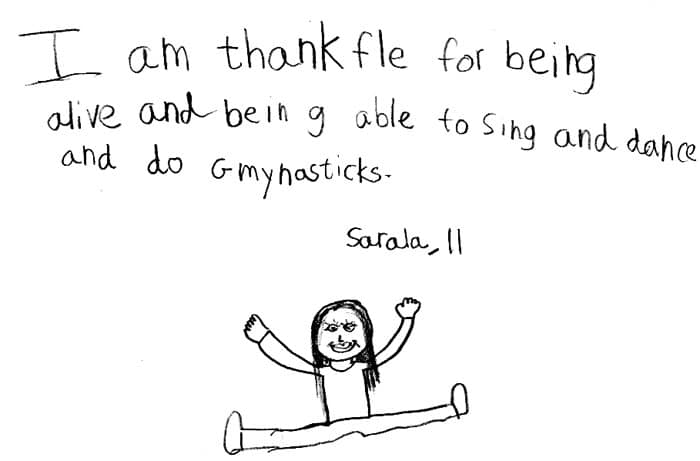
On the morning of their father’s yartzeit ceremony in Israel several years ago, Sarah Berkovits’ brother, Berel Berkovits, simply didn’t wake up. Recalling that day in her book Gratitude with Grace, she wrote, “I realized in a more profound way than ever before what an amazing gift each day is, given to us by the Creator of the World.”
Berkovits never expected to write a book on gratitude. A clinical psychologist in New York, she told the Jewish Journal, “I wasn’t always a grateful person. For many years I had a lot of anger, guilt, and frustration. Without going into details, I had good reason for it, and I spent many years determined to overcome it. Ungrateful people are ultimately unhappy people, so moving from that place of negativity to a place of gratitude is one of the biggest achievements in my life.”
Berkovits also suffered two very serious accidents within one year, including a brush with death after being hit by a car at night. She was extremely grateful that her life had been spared and for the loving community that supported her through these two lengthy convalescences. They brought her meals, chocolates, flowers, books, CDs, and friendship.
During this time she kept asking herself, “Why did God give me extra years? What am I supposed to do with them?”
During this time she kept asking herself, “Why did God give me extra years? What am I supposed to do with them?”
“Gratitude with Grace: An Inspirational and Practical Approach to Living Life as a Gift” is Berkovits’s eloquent answer. Written in a conversational but substantive style, the author offers a roadmap to the whys and hows of a life of gratitude, its short- and long-term benefits, the ways that Jewish practice is built on gratitude, and the surprising and well documented health benefits of gratitude—both physical and psychological. It includes dozens of charming yet profound drawings from children expressing what they are grateful for as well. This is a valuable book for all times, and is especially relevant today.
Here is an interview with Dr. Berkovits about why gratitude matters for adults as well as children, especially now.
JJ: You write that gratitude is a way of being and a state of mind. How can we maintain this during these anxious times?
SB: We need to live with humility, knowing that this is a test of our faith. God promised Abraham a great nation, a great name, and great wealth, but as soon as he followed God, he endured famine, his wife was kidnapped, and he was told to sacrifice his son. Abraham withstood all these tests, and as his descendants we also have the ability to withstand our tests. In terms of feeling gratitude, we’re seeing such an incredible response to this crisis, I don’t know that we’ve ever had such unity since we stood at Mount Sinai.
 Immediately after the war broke out, many of us could barely function, we were so filled with grief, anger, and confusion. I attended a rally near the UN with about 12,000 others, a wide cross section of our people. I felt that we were one heart, bleeding. That unity can give us strength. Knowing that God is with us helps us muster our energy.
Immediately after the war broke out, many of us could barely function, we were so filled with grief, anger, and confusion. I attended a rally near the UN with about 12,000 others, a wide cross section of our people. I felt that we were one heart, bleeding. That unity can give us strength. Knowing that God is with us helps us muster our energy.
We are seeing such an outpouring of wonderful things that are also expressions of gratitude, in heart and in action. These expressions will continue to open hearts and eyes to see the beauty in front of us. Something big is happening, an awakening. Just as after the 1967 war, many people became more religious, this is happening now, too. Many Jews are thinking about our history and our mission in meaningful ways.
 JJ: It is easier to start a gratitude practice, such as keeping a journal, than to maintain it. What happens when “gratitude fatigue” sets in?
JJ: It is easier to start a gratitude practice, such as keeping a journal, than to maintain it. What happens when “gratitude fatigue” sets in?
SB: Writing in a gratitude journal focuses your attention and concretizes the practice. Even if you write for only five minutes a day, it stirs up feelings of gratitude for other things, possibly things from long ago where you still reap benefits. But if you feel burned out, take a break from writing for a few weeks. You can also think and say out loud the things you are grateful for.
 The morning Modah Ani blessing is only twelve words but I take up to ten minutes to finish it, because I am also listing many things I am grateful for. I may reexperience things from the past, such as the taste of the delicious cakes my mother used to make, or the enjoyment I had when I used to ride bikes with my brother. This increases my gratitude and awareness of how blessed I am.
The morning Modah Ani blessing is only twelve words but I take up to ten minutes to finish it, because I am also listing many things I am grateful for. I may reexperience things from the past, such as the taste of the delicious cakes my mother used to make, or the enjoyment I had when I used to ride bikes with my brother. This increases my gratitude and awareness of how blessed I am.
JJ: You devote a chapter to helping children develop their own gratitude practice. Why?
SB: Before becoming a psychologist, I had taught in many Jewish and non-Jewish schools in the U.K. and the U.S. I saw that we stuff children with facts but don’t teach them to think. And I saw that we need to listen to children more. When they are really listened to, they feel grateful that somebody is taking them seriously. Over time, repeated experiences of being listened to leads to their feeling gratitude more frequently, until it becomes part of their nature.
Listening to children makes them feel real, valued, and understood. It deepens their experience of themselves. It’s important for adults to know what they’re thinking and feeling, including their concerns, anxieties, and worries. Today more than ever, children need to be listened to, to help them make sense of the world, of themselves, and of others.
Gratitude didn’t come naturally to the children I taught or to the adults around them. There was work to do. I began asking children what they were grateful for. When they said, “my family and friends” I wasn’t satisfied. I wanted them to go deeper. They began to open up, sometimes in very profound ways. One nine-year-old wrote about how thankful he was for his mother, who had died, because of the lessons she taught him. That was so profound, his ability to hold on to that. Often, the children were very funny. A ten-year-old girl wrote, “I’m thankful that my sister got married because now she’s nicer to me because she can’t show she’s mean in front of her husband.”
In our morning blessings we thank God for opening our eyes. This is literal and figurative. The children have opened my eyes, helping me see their innocence, their beauty, the profundity of their inner world, and their sacredness. These days, parents may ask their kids, “how was your day?” while looking at a text. They may assuage their guilt for not being present enough by giving too much materially. This robs the child of a parent’s presence and works against a gratitude mindset. Children need to see adult role models expressing gratitude. And we need to be grateful even in trying times.
Judy Gruen is the author of several books, including “The Skeptic and the Rabbi: Falling in Love With Faith.” Her next book, “Bylines and Blessings,” will be published in February 2024.























 More news and opinions than at a Shabbat dinner, right in your inbox.
More news and opinions than at a Shabbat dinner, right in your inbox.